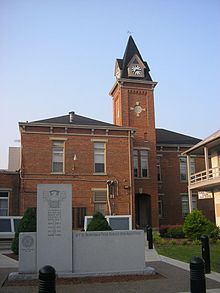Pendleton County, Kentucky
| Pendleton County, Kentucky | |
|---|---|

Pendleton County courthouse in Falmouth
|
|
 Location in the U.S. state of Kentucky |
|
 Kentucky's location in the U.S. |
|
| Founded | 1798 |
| Named for | Edmund Pendleton |
| Seat | Falmouth |
| Largest city | Falmouth |
| Area | |
| • Total | 282 sq mi (730 km2) |
| • Land | 277 sq mi (717 km2) |
| • Water | 4.8 sq mi (12 km2), 1.7% |
| Population | |
| • (2010) | 14,877 |
| • Density | 54/sq mi (21/km²) |
| Congressional district | 4th |
| Time zone | Eastern: UTC-5/-4 |
| Website | pendletoncounty |
Pendleton County is a county located in the U.S. state of Kentucky. As of the 2010 census, the population was 14,877. Its county seat is Falmouth. The county was founded December 31, 1798,
Pendleton County is included in the Cincinnati-Middletown, OH-KY-IN Metropolitan Statistical Area.
Pendleton County was created from parts of Campbell and Bracken counties in 1798. The county was named after Edmund Pendleton, a longtime member of the Virginia House of Burgesses, the Continental Congress and chief justice of Virginia.
Falmouth, the future county seat, began as a settlement called Forks of Licking, circa 1776. It was the site of the Battle of Blue Licks during the Revolutionary War. Native Americans who were helping the British ambushed Kentuckians on August 19, 1782 on the Licking River. In a matter of fifteen minutes, 60 were killed.
Falmouth was chartered in 1793. Its name originated from the Virginians who settled there from Falmouth, Virginia. It was also in 1793 that one of the first sawmills in Kentucky was built in Falmouth. Falmouth was designated the county seat in 1799. The county courthouse was erected in 1848.
During the American Civil War, the county sent men to both armies. A Union Army recruiting camp was established in Falmouth in September 1861. Two Confederate recruiters were captured and executed by the Union Army in the Peach Grove area of northern Pendleton County. In July 1862, a number of county citizens were rounded up by Union troops during a crackdown against suspected Confederate sympathizers. In June 1863, a number of women were arrested at Demossville because they were believed to be potential spies dangerous to the Federal government. Falmouth was the site of a small skirmish on September 18, 1862, between twenty-eight Confederates and eleven Home Guardsmen.
...
Wikipedia
